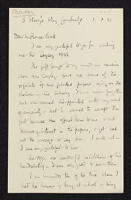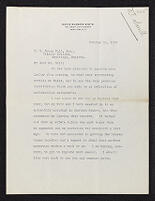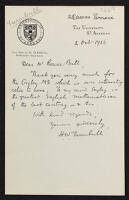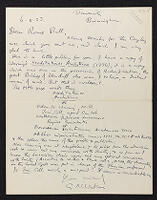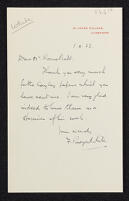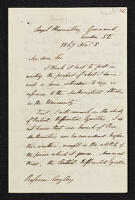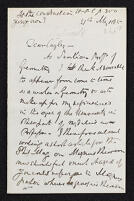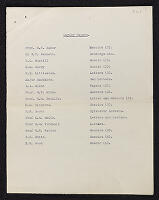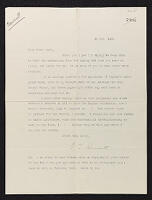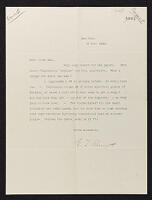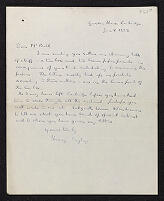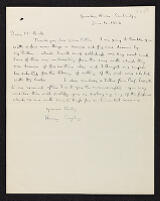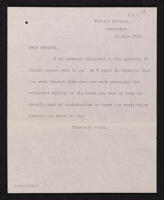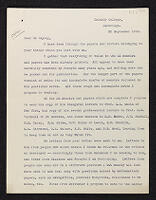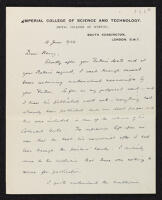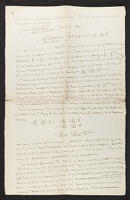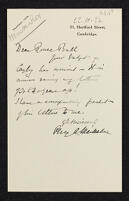The nine letters reflect the two men's shared interest in mathematics and their closer ties of friendship: the discussions of mathematical problems and recent work appear in letters with private nicknames: Brer B'ar and Wicked Will (Johnson) and Brer Crawfish and Bullfrog (Glaisher). Glaisher also shares his opinions on international copyright, the cost of books used by schools, his work editing papers, his preferred work pattern. He writes a good deal about Trinity College life and politics, noting with pleasure the number of Trinity men in the Cabinet, and provides an assessment of Prince Albert Victor at Trinity ("I only hate him when he picks his teeth"). In one 30 page letter dated 25 October 1888 he writes candidly about the internal politics surrounding the election of a Trinity representative to the University Council, and has much to say about certain members of the Trinity College Fellowship: H. M. Taylor, A. R. Forsyth, Arthur Cayley, Henry Jackson, James Ward, J. N. Langley, and the Master H. M. Butler. Accompanying the letters is a note dated 21 Feb. 1891 recording a divided vote on Tutorial accounts which appears to have been separated from an explanatory letter.
3 Storey's Way, Cambridge. - Thanks Rouse Ball for sending him the Cayley MSS, which he is very glad to have. Was at school with Cayley's son Henry; remembers doing Latin prose with him, and the 'various mathematical adventures' they had together; regrets not hearing of his later life.
The Master's Lodge, St. John's College, Cambridge. - Thanks Rouse Ball for sending him the letters from Sylvester to Cayley; has 'only as yet just opened the parcel but it is clear that there is a good deal of matter in them'.
501 West 130th Street, New York City. - Good to receive Ball's letter this morning, read his article on Euler, and to see 'the very generous contribution which you made to my collection of mathematical autographs' [items selected from the papers of Arthur Cayley]. Hoped to see Ball in England last year but he and his wife had a car accident in France from which his wife has still not recovered; is hoping to get to England next summer. His History of Elementary Mathematics should come out this winter; will ensure Ball gets a copy.
Many thanks for sending the autograph material; has 'several thousand autograph letters of mathematicians, about a thousand of them being from people really worth while'; has tried to secure this material, with 'a great deal of Orientalia' in mathematics, for future historians of the subject; intends to leave it to his university and have it catalogued. Postcript: has noted on the Cayley letters that they came to him 'through [Ball's] kindness'.
2 Queen's Terrace [on headed notepaper, University of St Andrews]. - Thanks Rouse Ball very much for the Cayley MS; 'To my mind Cayley is the greatest English mathematician of the last century - and this'.
University, Birmingham. - Thanks Rouse Ball for the Cayley MSS, which he is very glad to have. Has a copy of Waring's Meditationes Analyticae (1776) once in the possession of Richard Watson, Bishop of Llandaff; the title page of this edition states that Waring was at Trinity, but Watson can find no suggestion that either Waring or the Lucasian chair had any connection with the college; asks if this is a misprint.
Trinity College, Cambridge.—Thanks them for a dressing-gown. Is feeling better, and got through his Whewell lecture without ill effects. There is concern that the Tests Bill will be shelved again, but the evidence presented by the Master and Appleton is good. Maxwell comes to see him and gives him ideas. Hopes they are both better.
—————
Transcript
Trinity College, Cambridge
Saturday
May 6
Dear Papa & Mama
How very kind of you to send me such a lovely thing. I have been wearing it nearly ever since. The only thing I regret is that I cannot go out of doors in it—I should look so swell if I walked around the paddock plunged in deep thought and a dressing gown. I am very much better, and have been nearly free from pain for several days: on Thursday I went for quite a long walk with Cayley, and yesterday I went out while it was sunny without being muffled up. Also I got through the Whewell lecture (one of a course that Sidgwick has organized) without ill effects. It rather frightened me, being much harder than my ordinary lectures; viz:, an hour and a half of steady talk about philosophical subjects where one had to be very careful of one’s terms. We are in a great state of mind about the Tests Bill, lest if the Lords should adopt the recommendations of the committee and stick to them, they may gain time enough to get it shelved again. The evidence of our master before the committee is very good; and Appleton’s is lovely. {1} I am so sorry you can’t come up. The sun is quite bright today, and it looks so tempting—on the other hand I burn to be at some equations which I know only want shaking to give lots of Theorems. Maxwell comes often to see me and gives me ideas. Good bye. I hope you are both better. Give my love to Eliza. Kate is to stay with you when I am at home.
your most loving son
Willie.
—————
{1} The House of Lords went into committee to discuss the University Tests Bill some time before 9 May 1871. The evidence presented to the committee by C. E. Appleton is referred to in The Times of that day (p. 5).
Requesting certain volumes of the Monthly Notices of the [Royal Astronomical] Society.
St John's College, Cambridge - Thanks Rouse Ball for the Cayley papers; is very glad to have them as a specimen of his work.
Royal Observatory, Greenwich, London S. E. - Thinks it 'best to put in writing the purport of what I have said or have intended to say in reference to the Mathematical Studies in the University'; comments first on the study of partial differential equations, which 'are very useful and therefore stand very high., as far as the Second Order. They apply... to the great problems of nature concerning time, and infinite division of matter, and space.. Beyond that Order they apply to nothing'.
Discusses 'what I may call the moral part' of mathematical studies: thinks a 'heavy responsibility' lies on those responsible for the course of education in the University to direct it 'in the way in which it will be most useful to the students' by 'disciplining their powers and habits' and 'giving them scientific knowledge of the highest and most accurate order (applying to the phenomena of nature) such as will be useful to them through life'; does not think that the 'mere personal taste of a teacher is sufficient justification for a special course' unless these aspects are taken into consideration.
Has for some years inspected the examination papers, and considers that except for the very best students there is currently 'a prodigious loss of time without any permanent good whatever', since only a very few such as Adams and Stokes retain their study of abstract analytical geometry. Believes that in contrast a 'careful selection of physical subjects would enable the University to communicate to its students a vast amount of information; of accurate kind and requiring the most logical treatment; but so bearing upon the natural phenomena which are constantly before us that it would be felt by every student to possess a real value' and therefore remain in the mind and 'raise the national character'.
Is 'old enough to remember the time of more geometrical processes' and believes that 'for the cultivation of accurate mental discipline they were far superior to the operations in vogue at the present day. There is no subject in the world more favourable to logical habit than the Differential Calculus in all its branches...'; thinks a return to study of it would be 'far more advantageous... than the simple applications to Pure Equations and Pure Algebraical Geometry now occupying so much attention'.
Trinity - M. Crelle has been publishing a series of facsimiles, generally concerning the handwriting of a distinguished mathematician, in in the Journal der Mathematik, and AC has 'perhaps rashly' promised to supply him with some English examples. Would WW let him extract two or three letters from the volume of Newton's correspondence in the College library?
'As Savilian Prof[esso]r of Geometry I think it desirable to appear from time to time as a worker on Geometry so as to make up for my deficiencies in the eyes of the University in other parts of my duties as Professor'; intends to write a short article for the Philosophical Magazine on Magnus' theorem and asks Cayley to refer him to Magnus' original paper; 'I can apply my equations to obtain the motion required to bring the two schemes onto perspective relation very simply - ie I can get what you call the kinetic matrix'. Further discussion of this, in relation to Cayley's work.
The list gives the name of each recipient, and a brief note of what they were sent of Cayley's papers by Rouse Ball. The copies of letters sent to recipients are in most case form letters, explaining that on the death of Cayley's widow his papers were put into Rouse Ball's hands with a request that he should destroy or dispose of them as he saw fit; 'all involving matter which might be published was dealt with years ago, and what was preserved has no interest beyond the fact that it is a specimen of his work'. Longer letters were sent to G. T. Bennett, also asking whether he would like to see the models of Archimedean and other solids made by W. W. Taylor, and to D. E. Smith, also taking the opportunity to send a paper on Euler which might be of interest to the American Mathematical Monthly. A long second letter to E. H. Neville gives details of the nature of Cayley's papers, and the principles by which Rouse Ball decided what should be destroyed: 'As for letters to him, of which many hundreds were put in my hands, I laid down the rule that in general such letters should be destroyed or sent back to the writers if they were alive'; lists the few exceptions; the letter also suggests that Neville take a look at Monge's Card-Shuffling Problem.
On embossed notepaper for Emmanuel College, Cambridge. - Would be glad to have the selections from the Cayley papers which Rouse Ball has set aside for him; already has a few specimens of Cayley's autograph work which Forsyth sent him when editing Cayley's collected works, but the papers Rouse Ball has chosen may have an 'intrinsic interest' for him. Has 'never really "gone in for" polyhedra', and doubts whether he deserves to have the Taylor collection, but would like to inspect it; wonders whether Hobson was right to decline it for the School [of Mathematics?]; polyhedra 'have now rather an extra importance, with the mathematical crystallography so much to the fore'; asks when and where he may see the models.
Six men, four of them identified by Jesson, and two by a later hand. A photograph below this on the page with the caption "Pembroke College" has been removed, before acquisition, as part of the caption is written in the space that would have been occupied by the photograph.
Emmanuel College, Cambridge. - Thanks Rouse Ball for [Cayley's] papers; 'Even these fragmentary 'remains' are very impressive. What a worker the great man was!'. Could have added a postscript to his previous letter: '"Bircloids remind me of those excellent plates of [Henry?] Perigal, of which I have never been able to get a copy"; is very glad to have the set of six now. Comments on [Cayley's?] 'oddly named' parabolites, and the 'elusive puzzle' of the page with no text showing some skew varieties.
Garden House Cambridge. - Is sending Rouse Ball 'rather an alarming bulk of stuff - a tin box and two brown paper parcels' following Rouse Ball's 'kind undertaking to examine [his father's] papers'. Asks Rouse Ball to communicate with him at Windemere about anything he finds of special interest, and to let him know persons to whom letters have been sent.
Garden House Cambridge. - Is sending Rouse Ball some 'curves and figures drawn by my Father... Some of them are interesting for the care with which they are drawn if for nothing else and I thought one might be selected for the library if nothing of the sort was selected with the books'. Also encloses a letter from Professor Forsyth [now O.6.6/40]; 'you may consider this will justify you in destroying any of the papers which no one will care to keep for sentimental reasons'.
Calgarth Corner, WIndermere. - Thanks Rouse Ball for the trouble he has taken in going through his father's papers. Agrees with all the suggestions made about disposal; 'afraid too the time has come to destroy most of the personal letters which you send me though some of them are interesting in themselves'.
Trinity College, Cambridge. - Is 'somewhat staggered by the quantity of Cayley papers' sent to him; asks if he is right in thinking that Forsyth went through them when preparing the collected edition of Cayley's works, and that his own task is 'chiefly that of distribution to those who would value letters and notes by him'.
Trinity College, Cambridge. - Has been through Cayley's father's papers gathers that 'everything of value in the MS memoirs and papers has already been printed. All appear to have been carefully examined by Forsyth many years ago, and nothing more can be picked out for publication'. The largest part of the papers 'consist of notes for and incomplete drafts of memoirs included in his published works. All these rough and incomplete notes I propose to destroy'.
Lists proposed recipients of materials. Has no letters himself from Arthur Cayley. Thinks letters from living writers should be either returned to them or destroyed; is therefore returning MacMahon's letters, and destroying those from Glaisher and Forsyth. Of letters from people now dead he proposes to send those from Sylvester to the Master of St John's [R. F. Scott]; thinks most of the rest should be destroyed, though he mentions a few people to whom he would like to send 'a certain number' which he feels would be unproblematic to send. Encloses a few letters and papers 'of a personal character' for Cayley to take care of.
Laregan, France Lynch, Glos. - Thanks Rouse Ball for thinking of him in the distribution of Cayley's papers; will put the MS in the Collected Works and 'treasure it for its giver's sake as well as its writer's'. Has now retired from 'active service at Liverpool' and moved down to Gloucestershire with his wife and daughters; describes the neighbourhood. Asks for news of the Frazers. Would like to subscribe to the fund for the Master's portrait, but does not want a print; 'the reason is not that I do not admire J. J's great scientific achievements, but that I have a smaller house now'.
Imperial College of Science and Technology (Royal College of Science), South Kensington, London, S. W. 7. - Shortly after Cayley's father's death, Forsyth went through his papers at his widow's request; considers that 'everything had already been published save one short paper: and this was included in one of the volumes of his Collected Works'. Understands from personal experience how troublesome the task of dealing with papers can be.
Forwarding a document which should be returned to the Vice Chancellor [Butler?] before the Council meeting. Document no longer present.
31 Hertford Street, Cambridge. - The letters he wrote to Cayley have arrived; 'curious seeing my letters of 30-40 years ago!'; has a 'corresponding packet' of Cayley's letters to him.
